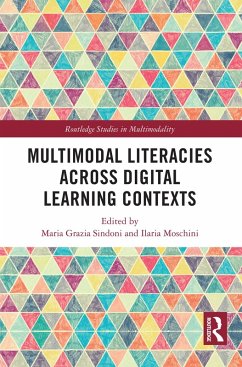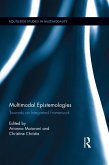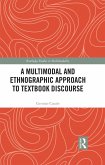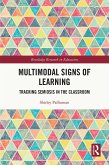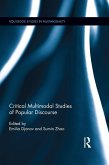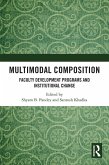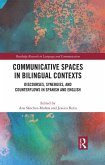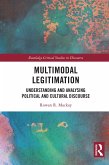Multimodal Literacies Across Digital Learning Contexts (eBook, ePUB)
Redaktion: Sindoni, Maria Grazia; Moschini, Ilaria
42,95 €
42,95 €
inkl. MwSt.
Sofort per Download lieferbar

21 °P sammeln
42,95 €
Als Download kaufen

42,95 €
inkl. MwSt.
Sofort per Download lieferbar

21 °P sammeln
Jetzt verschenken
Alle Infos zum eBook verschenken
42,95 €
inkl. MwSt.
Sofort per Download lieferbar
Alle Infos zum eBook verschenken

21 °P sammeln
Multimodal Literacies Across Digital Learning Contexts (eBook, ePUB)
Redaktion: Sindoni, Maria Grazia; Moschini, Ilaria
- Format: ePub
- Merkliste
- Auf die Merkliste
- Bewerten Bewerten
- Teilen
- Produkt teilen
- Produkterinnerung
- Produkterinnerung

Bitte loggen Sie sich zunächst in Ihr Kundenkonto ein oder registrieren Sie sich bei
bücher.de, um das eBook-Abo tolino select nutzen zu können.
Hier können Sie sich einloggen
Hier können Sie sich einloggen
Sie sind bereits eingeloggt. Klicken Sie auf 2. tolino select Abo, um fortzufahren.

Bitte loggen Sie sich zunächst in Ihr Kundenkonto ein oder registrieren Sie sich bei bücher.de, um das eBook-Abo tolino select nutzen zu können.
This collection critically considers the question of how learning and teaching should be conceived, understood, and approached in light of the changing nature of learning scenarios and new pedagogies in this current age of multimodal digital texts, practices, and communities.
- Geräte: eReader
- mit Kopierschutz
- eBook Hilfe
Andere Kunden interessierten sich auch für
![Multimodal Epistemologies (eBook, ePUB) Multimodal Epistemologies (eBook, ePUB)]() Multimodal Epistemologies (eBook, ePUB)44,95 €
Multimodal Epistemologies (eBook, ePUB)44,95 €![A Multimodal and Ethnographic Approach to Textbook Discourse (eBook, ePUB) A Multimodal and Ethnographic Approach to Textbook Discourse (eBook, ePUB)]() Germán CanaleA Multimodal and Ethnographic Approach to Textbook Discourse (eBook, ePUB)42,95 €
Germán CanaleA Multimodal and Ethnographic Approach to Textbook Discourse (eBook, ePUB)42,95 €![Multimodal Signs of Learning (eBook, ePUB) Multimodal Signs of Learning (eBook, ePUB)]() Shirley PalframanMultimodal Signs of Learning (eBook, ePUB)42,95 €
Shirley PalframanMultimodal Signs of Learning (eBook, ePUB)42,95 €![Critical Multimodal Studies of Popular Discourse (eBook, ePUB) Critical Multimodal Studies of Popular Discourse (eBook, ePUB)]() Critical Multimodal Studies of Popular Discourse (eBook, ePUB)48,95 €
Critical Multimodal Studies of Popular Discourse (eBook, ePUB)48,95 €![Multimodal Composition (eBook, ePUB) Multimodal Composition (eBook, ePUB)]() Multimodal Composition (eBook, ePUB)42,95 €
Multimodal Composition (eBook, ePUB)42,95 €![Communicative Spaces in Bilingual Contexts (eBook, ePUB) Communicative Spaces in Bilingual Contexts (eBook, ePUB)]() Communicative Spaces in Bilingual Contexts (eBook, ePUB)42,95 €
Communicative Spaces in Bilingual Contexts (eBook, ePUB)42,95 €![Multimodal Legitimation (eBook, ePUB) Multimodal Legitimation (eBook, ePUB)]() Rowan R. MackayMultimodal Legitimation (eBook, ePUB)42,95 €
Rowan R. MackayMultimodal Legitimation (eBook, ePUB)42,95 €-
-
-
This collection critically considers the question of how learning and teaching should be conceived, understood, and approached in light of the changing nature of learning scenarios and new pedagogies in this current age of multimodal digital texts, practices, and communities.
Dieser Download kann aus rechtlichen Gründen nur mit Rechnungsadresse in A, B, BG, CY, CZ, D, DK, EW, E, FIN, F, GR, HR, H, IRL, I, LT, L, LR, M, NL, PL, P, R, S, SLO, SK ausgeliefert werden.
Produktdetails
- Produktdetails
- Verlag: Taylor & Francis eBooks
- Seitenzahl: 286
- Erscheinungstermin: 29. November 2021
- Englisch
- ISBN-13: 9781000505467
- Artikelnr.: 62827441
- Verlag: Taylor & Francis eBooks
- Seitenzahl: 286
- Erscheinungstermin: 29. November 2021
- Englisch
- ISBN-13: 9781000505467
- Artikelnr.: 62827441
- Herstellerkennzeichnung Die Herstellerinformationen sind derzeit nicht verfügbar.
Maria Grazia Sindoni, PhD, is Professor of English Linguistics and Translation in the Department of Ancient and Modern Civilizations at the University of Messina, Italy. Her main interests include multimodal discourse studies, systemic-functional grammar, applied linguistics and video-mediated communication. Ilaria Moschini, PhD, is Assistant Professor of English Linguistics and Translation in the Department of Education, Languages, Intercultures, Literatures and Psychology at the University of Florence, Italy. Her main research interests are digital media language and political discourse that she investigates adopting a critical multimodal approach.
Multimodal Literacies Across Digital Learning Contexts: An Open-Ended
Agenda
Maria Grazia Sindoni and Ilaria Moschini
1. A Sensational Theory of Designed Experience: Replacement Parts for a
Theory of Multimodality
Qing Archer Zhang and James Paul Gee
2. Pedagogies for Digital Learning: From Transpositional Grammar to the
Literacies of Education
Bill Cope and Mary Kalantzis
Section A. Focus on Children: From Pre-School to Primary Education
3. Stars, Scores and Cheers. A Social Semiotic Critique of "Fun"
Learning in Commercial Educational Software for Children
Gunhild Kvåle
4. Storytelling with Children in Informal Contexts: Learning to Narrate
Across the Offline/Online Boundaries
Maria Bortoluzzi, Elisa Bertoldi and Ivana Marenzi
5. Multilingual Children's Expressions of Participation in Preschools
Using Digital Tablets Petra Petersen
6. Watching the Sound: Sign-Making in Musical Expressiveness of Children
with Motor-Related Disabilities Made Through Eye Tracking Software
Záira Bomfante Dos Santos, Clarice Lage Gualberto and Sônia Maria
Oliveira Pimenta
7. Popularizing Scientific Knowledge for Children: A Multimodal
Perspective
Giuliana Diani
Section B. Focus on Youth: From Secondary to Higher Education
8. Exploring Multimodality in Video Podcasting to Enhance Intercultural
Awareness in the East Asian Context
Martin Parsons, Mikel Garant and Larry Walker
9. Recognition of Student Resources in Digital Environments
Arlene Archer
10. Theory and Practice of the Common Framework of Reference for
Intercultural Digital Literacies (CFRIDiL)
Maria Grazia Sindoni, Elisabetta Adami, Styliani Karatza, Ilaria
Moschini and Sandra Petroni
Section C. Focus on Teachers: Practices and Pedagogies
11. Preparing for Teaching Digital Literacies in the Curriculum
Disciplines: Meta-Semiotic Knowledge and Pedagogy
Pauline Jones, Annette Turney, Helen Georgiou and Wendy Nielsen
12. Analyzing Attitudinal Stance in OpenCourseWare Lectures: An
Experimental Mixed-Method Approach
Belinda Crawford Camiciottoli
13. Making Science Easier to Access: Investigating Academic Social
Networks as "Composites of Connotations"
Flavia Cavaliere
14. Teaching, Learning and Assessment of Multimodal Digital Academic
Numeracy Practices
Robert Prince
Agenda
Maria Grazia Sindoni and Ilaria Moschini
1. A Sensational Theory of Designed Experience: Replacement Parts for a
Theory of Multimodality
Qing Archer Zhang and James Paul Gee
2. Pedagogies for Digital Learning: From Transpositional Grammar to the
Literacies of Education
Bill Cope and Mary Kalantzis
Section A. Focus on Children: From Pre-School to Primary Education
3. Stars, Scores and Cheers. A Social Semiotic Critique of "Fun"
Learning in Commercial Educational Software for Children
Gunhild Kvåle
4. Storytelling with Children in Informal Contexts: Learning to Narrate
Across the Offline/Online Boundaries
Maria Bortoluzzi, Elisa Bertoldi and Ivana Marenzi
5. Multilingual Children's Expressions of Participation in Preschools
Using Digital Tablets Petra Petersen
6. Watching the Sound: Sign-Making in Musical Expressiveness of Children
with Motor-Related Disabilities Made Through Eye Tracking Software
Záira Bomfante Dos Santos, Clarice Lage Gualberto and Sônia Maria
Oliveira Pimenta
7. Popularizing Scientific Knowledge for Children: A Multimodal
Perspective
Giuliana Diani
Section B. Focus on Youth: From Secondary to Higher Education
8. Exploring Multimodality in Video Podcasting to Enhance Intercultural
Awareness in the East Asian Context
Martin Parsons, Mikel Garant and Larry Walker
9. Recognition of Student Resources in Digital Environments
Arlene Archer
10. Theory and Practice of the Common Framework of Reference for
Intercultural Digital Literacies (CFRIDiL)
Maria Grazia Sindoni, Elisabetta Adami, Styliani Karatza, Ilaria
Moschini and Sandra Petroni
Section C. Focus on Teachers: Practices and Pedagogies
11. Preparing for Teaching Digital Literacies in the Curriculum
Disciplines: Meta-Semiotic Knowledge and Pedagogy
Pauline Jones, Annette Turney, Helen Georgiou and Wendy Nielsen
12. Analyzing Attitudinal Stance in OpenCourseWare Lectures: An
Experimental Mixed-Method Approach
Belinda Crawford Camiciottoli
13. Making Science Easier to Access: Investigating Academic Social
Networks as "Composites of Connotations"
Flavia Cavaliere
14. Teaching, Learning and Assessment of Multimodal Digital Academic
Numeracy Practices
Robert Prince
Multimodal Literacies Across Digital Learning Contexts: An Open-Ended
Agenda
Maria Grazia Sindoni and Ilaria Moschini
1. A Sensational Theory of Designed Experience: Replacement Parts for a
Theory of Multimodality
Qing Archer Zhang and James Paul Gee
2. Pedagogies for Digital Learning: From Transpositional Grammar to the
Literacies of Education
Bill Cope and Mary Kalantzis
Section A. Focus on Children: From Pre-School to Primary Education
3. Stars, Scores and Cheers. A Social Semiotic Critique of "Fun"
Learning in Commercial Educational Software for Children
Gunhild Kvåle
4. Storytelling with Children in Informal Contexts: Learning to Narrate
Across the Offline/Online Boundaries
Maria Bortoluzzi, Elisa Bertoldi and Ivana Marenzi
5. Multilingual Children's Expressions of Participation in Preschools
Using Digital Tablets Petra Petersen
6. Watching the Sound: Sign-Making in Musical Expressiveness of Children
with Motor-Related Disabilities Made Through Eye Tracking Software
Záira Bomfante Dos Santos, Clarice Lage Gualberto and Sônia Maria
Oliveira Pimenta
7. Popularizing Scientific Knowledge for Children: A Multimodal
Perspective
Giuliana Diani
Section B. Focus on Youth: From Secondary to Higher Education
8. Exploring Multimodality in Video Podcasting to Enhance Intercultural
Awareness in the East Asian Context
Martin Parsons, Mikel Garant and Larry Walker
9. Recognition of Student Resources in Digital Environments
Arlene Archer
10. Theory and Practice of the Common Framework of Reference for
Intercultural Digital Literacies (CFRIDiL)
Maria Grazia Sindoni, Elisabetta Adami, Styliani Karatza, Ilaria
Moschini and Sandra Petroni
Section C. Focus on Teachers: Practices and Pedagogies
11. Preparing for Teaching Digital Literacies in the Curriculum
Disciplines: Meta-Semiotic Knowledge and Pedagogy
Pauline Jones, Annette Turney, Helen Georgiou and Wendy Nielsen
12. Analyzing Attitudinal Stance in OpenCourseWare Lectures: An
Experimental Mixed-Method Approach
Belinda Crawford Camiciottoli
13. Making Science Easier to Access: Investigating Academic Social
Networks as "Composites of Connotations"
Flavia Cavaliere
14. Teaching, Learning and Assessment of Multimodal Digital Academic
Numeracy Practices
Robert Prince
Agenda
Maria Grazia Sindoni and Ilaria Moschini
1. A Sensational Theory of Designed Experience: Replacement Parts for a
Theory of Multimodality
Qing Archer Zhang and James Paul Gee
2. Pedagogies for Digital Learning: From Transpositional Grammar to the
Literacies of Education
Bill Cope and Mary Kalantzis
Section A. Focus on Children: From Pre-School to Primary Education
3. Stars, Scores and Cheers. A Social Semiotic Critique of "Fun"
Learning in Commercial Educational Software for Children
Gunhild Kvåle
4. Storytelling with Children in Informal Contexts: Learning to Narrate
Across the Offline/Online Boundaries
Maria Bortoluzzi, Elisa Bertoldi and Ivana Marenzi
5. Multilingual Children's Expressions of Participation in Preschools
Using Digital Tablets Petra Petersen
6. Watching the Sound: Sign-Making in Musical Expressiveness of Children
with Motor-Related Disabilities Made Through Eye Tracking Software
Záira Bomfante Dos Santos, Clarice Lage Gualberto and Sônia Maria
Oliveira Pimenta
7. Popularizing Scientific Knowledge for Children: A Multimodal
Perspective
Giuliana Diani
Section B. Focus on Youth: From Secondary to Higher Education
8. Exploring Multimodality in Video Podcasting to Enhance Intercultural
Awareness in the East Asian Context
Martin Parsons, Mikel Garant and Larry Walker
9. Recognition of Student Resources in Digital Environments
Arlene Archer
10. Theory and Practice of the Common Framework of Reference for
Intercultural Digital Literacies (CFRIDiL)
Maria Grazia Sindoni, Elisabetta Adami, Styliani Karatza, Ilaria
Moschini and Sandra Petroni
Section C. Focus on Teachers: Practices and Pedagogies
11. Preparing for Teaching Digital Literacies in the Curriculum
Disciplines: Meta-Semiotic Knowledge and Pedagogy
Pauline Jones, Annette Turney, Helen Georgiou and Wendy Nielsen
12. Analyzing Attitudinal Stance in OpenCourseWare Lectures: An
Experimental Mixed-Method Approach
Belinda Crawford Camiciottoli
13. Making Science Easier to Access: Investigating Academic Social
Networks as "Composites of Connotations"
Flavia Cavaliere
14. Teaching, Learning and Assessment of Multimodal Digital Academic
Numeracy Practices
Robert Prince
